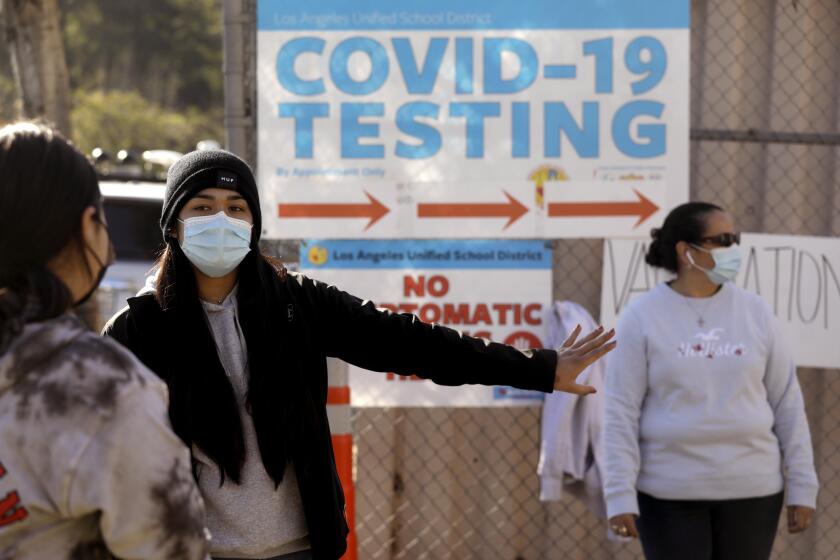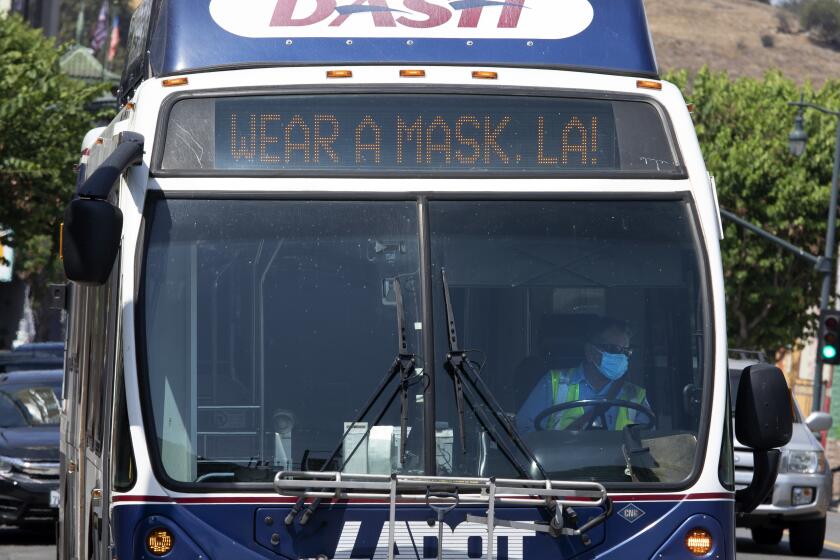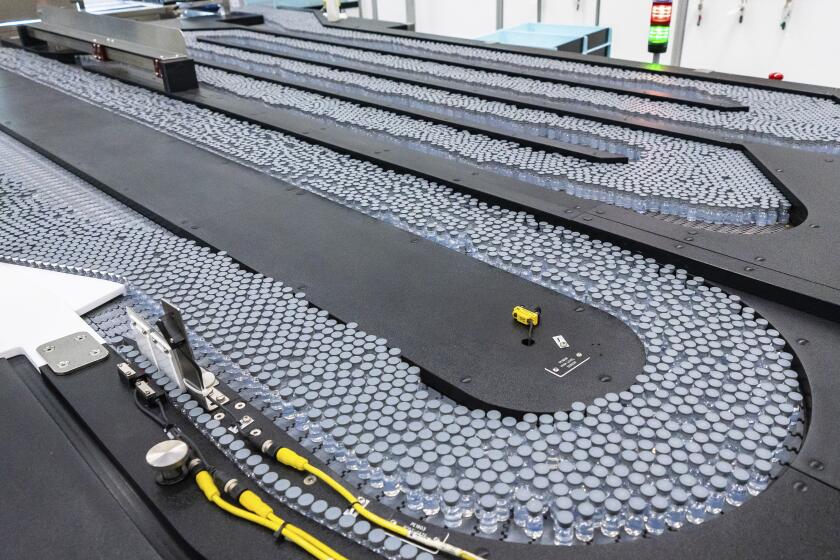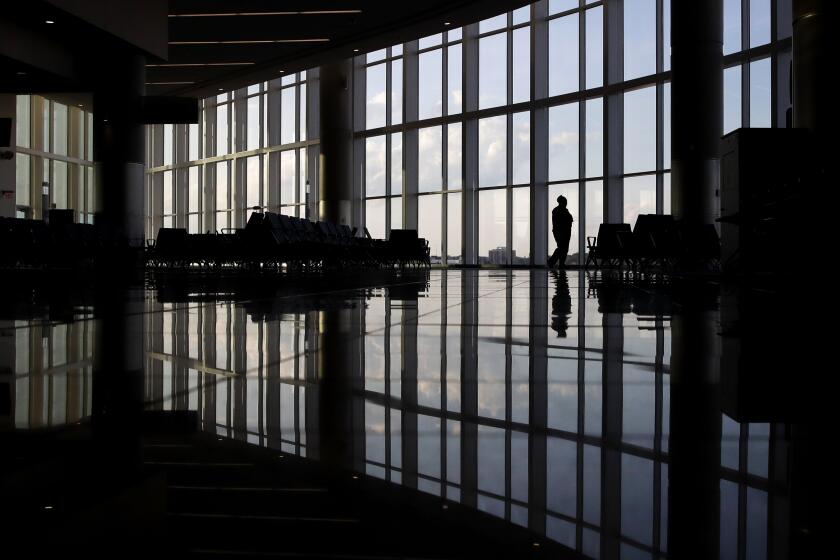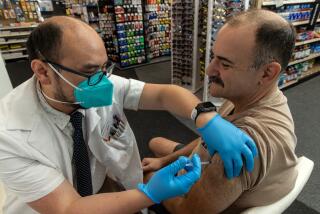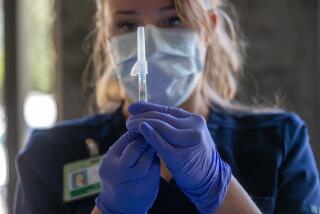California is easing COVID-19 mask recommendations as conditions improve. Here’s where
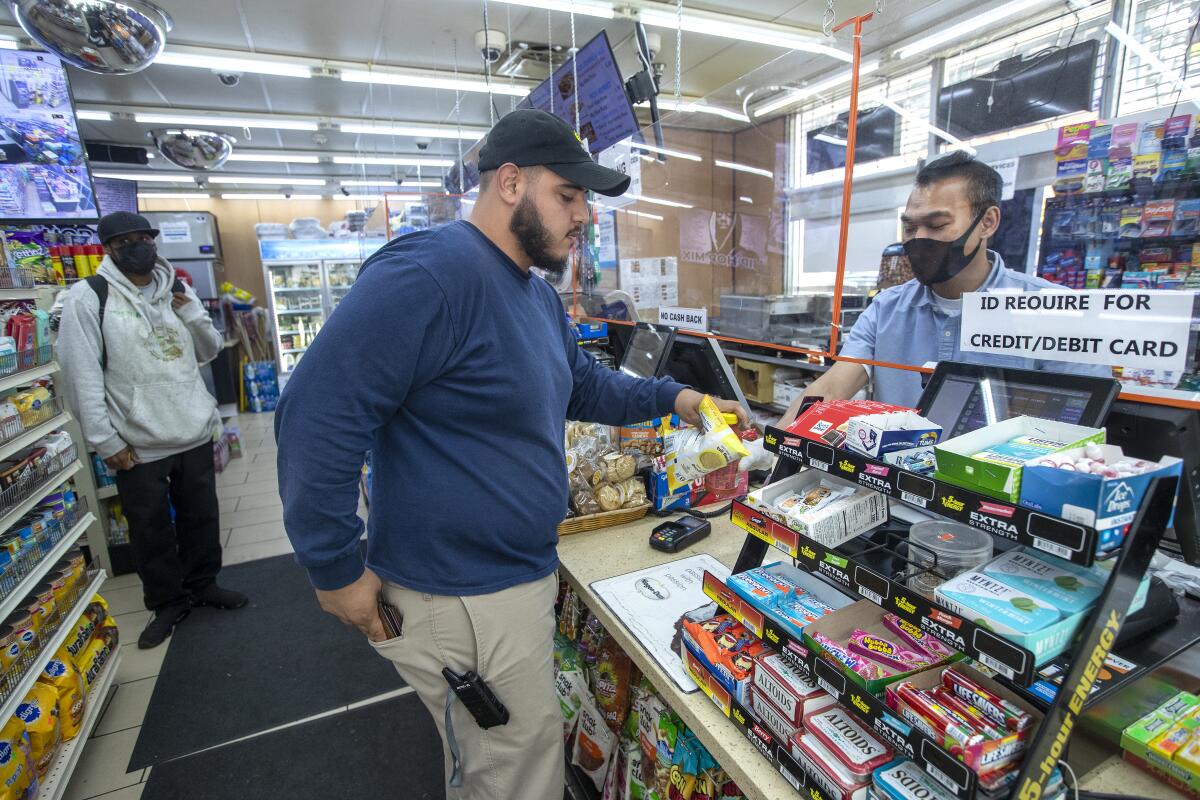
- Share via
In a new sign of improving coronavirus conditions, California will ease its mask-wearing recommendations for the first time in seven months.
The state is largely rescinding its broad recommendation that everyone — regardless of vaccination status — mask up when in indoor public settings and businesses. That guidance had been in place since mid-February.
Instead, California will recommend universal mask wearing only when a county’s COVID-19 community level — which indicates rates of new coronavirus-positive hospitalizations — is high.
Among the changes slated to take effect Friday is the end of state-ordered mandatory masking in jails and prisons, homeless shelters, and emergency and cooling centers located in counties with a low COVID-19 community level, as defined by the U.S. Centers for Disease Control and Prevention.
Placement in that category — which was home to 35 of California’s 58 counties as of early this week — indicates the pandemic is not having a major impact on hospitals. The CDC updates its community level assessments weekly, sorting counties into low, medium or high.
Facilities can make their own decisions on mask use, but if an outbreak were to occur, masking would again be required by the state in settings like jails and prisons, shelters and cooling centers, even if the local COVID-19 community level is low, according to the state health order. A county’s presence in the medium or high COVID-19 community level would result in a mask order in those settings.
In a statement Wednesday, the L.A. County Department of Public Health said it will align with the state and allow mask orders to end for jails, prisons, shelters and cooling centers starting Friday, unless a coronavirus outbreak is reported at a particular facility. L.A. County is in the low COVID-19 community level.
The county also will end its recommendation for universal masking in indoor public settings Friday, and instead say doing so will be a matter of personal preference.
Previously the county public health department said it would end its recommendation for universal masking once the region’s coronavirus case rate fell below 100 weekly cases for every 100,000 residents. L.A. County was just above that mark by Wednesday afternoon and is on track to dip below it in the coming days.
Once that threshold is crossed, L.A. County plans to also end its health order requiring people to wear masks on public transit or in indoor transportation hubs, such as airports.
California no longer requires coronavirus testing for unvaccinated workers at schools, healthcare facilities and other congregate settings.
Masks will remain required in healthcare facilities and long-term and senior care settings under a state health order. The state is requiring that businesses and venues, including K-12 schools, “must allow any individual to wear a mask if they desire.”
The changes will give “Californians the information they should consider when deciding when to wear a mask, including the rate of spread in the community and personal risk,” Dr. Tomás Aragón, California’s public health director and state health officer, said in a statement.
The Department of Public Health is moving toward ending its recommendation for universal masking in indoor public settings and businesses if coronavirus cases continue to fall.
They also reflect continued improvement in the Golden State’s pandemic metrics. For the seven-day period that ended Sept. 13, the most recent available, California was averaging about 5,900 cases a day — roughly a fourth of the peak of this summer’s wave.
The number of coronavirus-positive hospitalizations statewide also is declining. At the summer peak on July 26, the census of hospitalized coronavirus-positive patients was 4,843. As of Tuesday, there were 2,184. Still, that figure is above the springtime low of 949.
Even with the changes, when the COVID-19 community level is high, the California Department of Public Health will say mask wearing is recommended in indoor public settings for people at lower risk of severe illness and strongly recommended for people at higher risk.
According to the CDC, only three California counties — Merced, Madera and Kings, all in the Central Valley — are still in the high COVID-19 community level. They account for less than 2% of the state’s population, with fewer than 600,000 residents.
The updated bivalent COVID-19 booster shots are available at more than 1,500 sites in Los Angeles County. Here’s how to get one.
When the COVID-19 community level is medium, people at lower risk of severe illness are advised to consider wearing a mask in indoor public settings, while masking is recommended in crowded indoor spaces for those at higher risk.
About 8.7 million Californians, 22% of the state’s population, live in the 20 counties with a medium COVID-19 community level — San Bernardino, Sacramento, Fresno, Kern, Stanislaus, Sonoma, Tulare, Placer, Marin, Yolo, El Dorado, Imperial, Shasta, Humboldt, Mendocino, Tuolumne, Inyo, Mariposa, Trinity and Modoc.
When the COVID-19 community level is low, state health officials say people at lower risk of severe illness can consider wearing a mask based on their personal preference, informed by their own personal level of risk. Those at higher risk are advised to consider wearing a mask in crowded indoor public settings.
More than three-fourths of Californians live in the 35 counties with a low COVID-19 community level. Besides L.A. County, those include San Diego, Orange, Riverside, Ventura and Santa Barbara counties, and seven of the nine counties in the San Francisco Bay Area.
U.S. doctors should regularly screen all adults under 65 for anxiety, an influential health guidelines group proposed Tuesday.
Mask use is still recommended if you’ve been exposed to the coronavirus as a “close contact” of an infected person. The California Division of Occupational Safety and Health, also known as Cal/OSHA, goes a step further and requires employees exposed to the coronavirus to wear a mask for 10 days at work following their last exposure.
Being exposed to the coronavirus is defined as sharing the same indoor air space for at least 15 minutes over a 24-hour period.
Infected individuals are still asked to stay home for at least five days after their first symptoms or the date of their first positive test if they don’t have symptoms. They can exit isolation as early as the sixth day if they test negative on a rapid test, and generally can end isolation at the start of the 11th day without needing a negative test result.
But the state Department of Public Health recommends people who leave isolation between the sixth and 10th days wear a well-fitting mask when around other people, especially in indoor settings. Cal/OSHA goes a step further and requires recently infected employees to wear a mask at work until the end of the 10th day following onset of symptoms or their first positive test result.
California health officials say masking continues to provide a useful layer of protection against infection. In 2021, consistently wearing a face mask in indoor public settings reduced the risk of getting a coronavirus infection, the state Department of Public Health said, citing a study it published. And a 10% increase in self-reported mask wearing tripled the likelihood of slowing community transmission of the coronavirus, officials said, citing a series of surveys nationwide.
More to Read
Sign up for Essential California
The most important California stories and recommendations in your inbox every morning.
You may occasionally receive promotional content from the Los Angeles Times.
